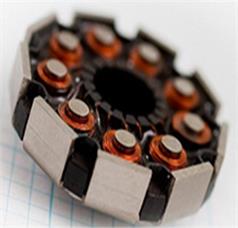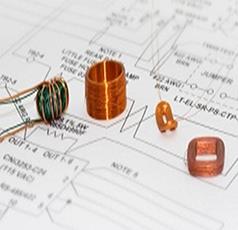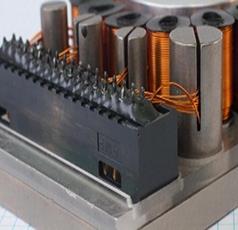Toll Free:1-800-724-5952
Electric Coils

Sag Harbor Industries (SHI) is one of the premier electric coil manufactures in the world. We pride ourselves on having the ability to produce custom electric coils to our customers’ exact orders. We have a wide assortment of automated coil winding machines to produce these electric coils with precision, efficiency and economy. We know that you turn to us to provide you with the products and solutions that add value to your overall process and application. This is why so much care and attention is put into each and every one of our electric coils. On top of the manufacturing of said electric coils we offer a number of other services that add value to your final product in addition to quality assurances and a variety of production capabilities.
Electric Coil Services Offered:
- Custom Wound and Finished Electric Coils
- Prototype to Production Quantities Available
- Turnkey and/or Kitted Opportunities Offered
- U.L. Listed Insulation Systems: B, F, and H
- Potting, Varnishing, Impregnation, Encapsulation and Molding Options
Electric Coil Production Capacities:
- Multi-headed Automatic Winding Equipment
- Inexpensive High and Low Volume Production Available
- Vacuum Impregnation and Molding Facilities On-Site
- Ultrasonic & Fusion Welding
- Hand & Dip Soldering
- 'Clean-Room' Available

Industries Served
- Aerospace
- Military and Naval Sensors
- Automotive
- Control Systems
Quality Assurances
We place a priority on quality. All of our electric coils, inductors, and other products are produced in compliance with our ISO 9001:2015 certification. We maintain the absolute highest quality control measures to ensure customer satisfaction. Our self-auditing and inspection techniques are rigorous and thorough, this ensures that our clients only receive the highest of quality electric coils. Our team undergoes training and certification programs to ensure expert craftsmanship.
Our ISO 9001:2015 certification gives our customers the confidence that our production facilities, our internal and external auditing methods and our quality control procedures meet or exceed international standards. We consistently rank in our customer’s “Highest Vendor Ratings”. From product conception to application, our goal is to produce the highest quality product; as well as to deliver it on the designated date consistently and to continually improve in every aspect of our business.
Value Added Services
Value-added services are available per your requirements and at the customer’s request.
- JIT/KanBan system options at our customer’s preference
- RoHS compliance at your request
- 24-hour response time when responding to feedback
- The products we make are completely proprietary and never compromised
- Personal and direct service with on-site communication
- Teamwork between us and you, with superior performance being the goal

Common Questions Regarding Electric Coils
The concept of the electric coil dates back to the late 19th century when Nikola Tesla introduced the "Tesla coil", a high frequency transformer that created high voltage at low current. Over the years, since its introduction, the “Tesla coil” has been improved and changed into the electric coils we know today.
The simple structure of electric coils contains a component that is the central part of nearly every form of electrical device. There is an endless number of applications that depends on the strength, durability, and exceptional performance of electric coils.
What is an Electric Coil?
An electric coil is an electrical conductor designed to increase the strength of a magnetic field. Wires on the coil are wrapped around a core made of ferromagnetic material with the number of turns of the wires of the coil determining the strength of the magnetic field, which is generated by the turns of the wire and passes through the core of the coil to produce a strong magnetic field.
A straight wire produces a magnetic field when electric current passes through it. The created field from a straight wire is strengthened when the wire is twisted and wound around a core material with each turn of the wire increasing the strength of the magnetic field. The strength of the created magnetic field is directly related to the number of loops of the wire wrapped around the core.
Electric coils are known as inductors, which are coils designed to control or decrease electric spikes by temporarily storing energy. The windings of an electric coil ensure that the current flow remains consistent.
How are Electric Coils Used?
Electric coils are one of the most common types of electronic components and are widely used in a variety of electrical circuits. Each type of electric coil is designed to meet the needs of an application.
Transformers
Transformers use several electric coils that work together to create a common magnetic field with power transmission being the transformer’s main function. The purpose of the transformers is to step down or step up the changes in power transmission and are used to isolate power lines for safety purposes.
Filters
Electric coils are used, along with other components, to maintain a stable signal frequency. Filters are used to block unwanted frequencies from a signal.
Relays
The magnetic field produced by a coil can be used to close and open an electrical switch. This is known as a relay. Using relays makes it possible for a tiny current into the coil to control very high levels of electric current flowing through the switch.
Automotive Electric Coils
Ignition coils have two sets of wire wrapped around an iron core with the primary winding being heavy wire while the secondary winding is smaller and lighter. The electric coils in a starter generate a magnetic field that turns the armature of the starter.
Transportation Electric Coils
Railroad tracks, armatures, and signals use electric coils to withstand the vibrations from rail traffic.
How Does an Electric Coil Work?
All wires produce a magnetic field when current passes through them. By winding, looping, and curling the wires, the power they are able to produce radically increases and more energy is stored.
A coil is defined by the frequency of the energy that passes through it. The types of current or frequencies are direct current (DC), audio frequency (AF), and radio frequency (RF). Additionally, electric coils are classified by their function, which are electromagnet, transformer, electric devices, and inductor.
When electricity passes through a circuit, it flows through a resistor into an electric coil, where the electric coil works to maintain stability and resists the flow of current. The increase in the current forces the coil release it and allow it to pass through. When the current is turned off, the electric coil works to maintain the flow and continue.
The process of an electric coil is rather simple but has a significant influence on the flow of current. In essence, electric coils stand as controllers and monitors of the flow of electricity. They function as safeguards and protectors of electric appliances and equipment by maintaining a constant flow of current, keeping electrical balance, and avoiding damaging overloads.
How Does a Coil Produce Electricity?
When a magnet moves in proximity to a coil of wire or a coil of wire moves in proximity to a magnet, the electrons in the wire are pushed and produce electric current. The electrons produced in the magnetic field all move in one direction to create a stable and well-defined magnetic field around the wire windings. The strength of the magnetic field is proportional to the amount of current that flows through the wire. As the current increases, the strength of the magnetic field increases.
A major influence on the current being generated is the number of loops of the wire on the core of the electric coil, which further increases the strength of the magnetic field. When electrical current passes through the coiled wire, it is referred to as an electromagnet with north and south poles. The current that passes through the wound wires can be controlled and be switched on and off, which allows control of the electricity that is generated.
The Sag Harbor Industries Difference
The focus of Sag Harbor Industries is our customers and their needs. We focus on providing value added services with an assurance of quality. In the electric coil industry, there is a wide variety of possible solution to electrical problems. Our over 70 years of experience allows us to offer the perfect solution for our customer’s complex problems, regardless of the conditions or environment.
Contact us at 1 800 724 5952 or follow us online at Twitter or Linkedin. Our highly trained and talented staff are waiting to provide you with the answers you need.
Made in America - Secure Your Supply Chain
Sag Harbor Industries is a conscientious manufacturer. As a quality first company, the workmanship of our products is just as important as its price. The quality of American made products is second to none. Our customers can be assured that Sag Harbor Industries products are assembled and made in America.
That’s The Sag Harbor Advantage
Quick Contact
Details of Sag Harbor Electric Coils Capabilities
| Coil Categories |
|
||
| Terminations |
|
||
| Wire Size | 2AWG - 52AWG | ||
| Wire Materials | Copper, Brass, Aluminum, Copper Clad Aluminum, Copper Nichol Alloys, Copper Tin Alloys, Silver, Gold, Stainless Steel | ||
| Wire Insulation Materials | Polyurethane, Polyester, Polyesterimide, Polyimide and combinations of these | ||
| Coil Temperature Ratings | 105⁰C - 240C⁰ | ||
| Bobbin Materials | Nylon 6/6, Glass filled nylon 6/6, Glass Filled PBT, Glass Filled PET(Rynite), Glass Filled PPS (Ryton), Liquid Crystal Polymer, Thermosetting Polymer, Phenolic, Glass filled DAP | ||
| Coil Finish | Over-Molded, Transfer molded, Poured Epoxy, Baked varnish, Air-Cured Varnish, Epoxy-Glass Wrapped, Cotton-Varnish, Tape Wrapped | ||
| Molding Materials | Rynite®(PET), Ryton®, Zytel® (nylon), Farboset | ||
| Encapsulation Material | Various Epoxies | ||
| U.L. Insulation Systems | Class B, F, H | ||
| Yokes and Frames | C and D type Frames along with Custom Yokes | ||



 Facebook
Facebook

